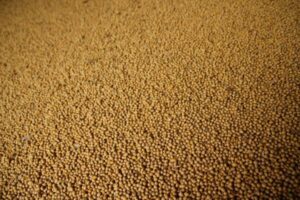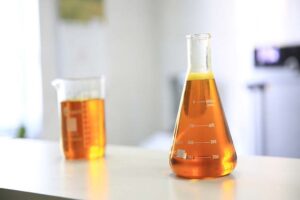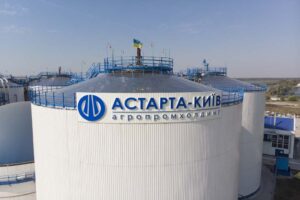
Lyst-Ruchky LLC (Ruchky village, Poltava region), part of Astarta agro-industrial holding, exported the first batch of organic soybeans under a contract with the German processing company Agriprotein GmbH, the agricultural holding’s press service reported.
“A supply contract of organic soybeans was concluded with the German processing company Agriprotein GmbH. As per contract, the quality of delivered products has to be confirmed in two stages. The first samples of soybeans were selected and tested by the European laboratory Galab (Germany) prior to signing a contract. The organic origin of the product and its high quality was confirmed. The second stage of the inspection took place upon delivery and organic status of soybeans was reaffirmed,” the company said on its website.
“As reported, last year Astarta completed a three-year journey to the first harvest of organic grain and oilseeds crops in sync with the European trend of expanding organic farming methods. In the 2021 season, the total area of the company’s land bank under organic products is 1,800 ha with the following crops: soybeans, millet, mustard, sunflower, corn and winter wheat,” the report says.
“The company also plans to certify this crops according to Bio Suisse (Switzerland) and USDA NOP (USA) standards,” it said.
As reported, Lyst-Ruchky in July 2020 received a certificate of a manufacturer of organic products. To confirm this status, it took three years of work in a transitional period, the corresponding intermediate inspections and certifications.

ASTARTA expands its product range and launches a pilot project on invert sugar syrup production. The initial batch is scheduled for August 2021.
The process of technological reequipment of the enterprise has already started. A special processing line will be installed at the Novoorzhytskiy sugar factory in the first half of July. The total investments are UAH0.5m.
– The main consumers of the first batch of inverted syrup will be Ukrainian beekeepers. This product can be used as feeding during the overwintering of bee colonies and helps to increase their productivity. It will also allow beekeepers to increase efficiency in their apiaries, introduce modern technologies and maintain a leading position in honey production in the world, – said project manager Ivan Chepak.
Invert sugar syrup is in demand with the confectionery industry as well. Therefore, in case of successful implementation of the pilot project, ASTARTA plans to increase the production of invert syrup and expand the marketing capabilities.
Thus, forming the added value of its products, ASTARTA increases the volume of products with a higher degree of processing, creates efficient production with a closed technological cycle and performs technical and technological reequipment of its enterprises.

Astarta agricultural holding started to produce sugar at Yareskivsky sugar plant (Yaresky village, Poltava region) from sugar imported under the tariff quota [which is 260,000 tonnes in 2021], the company said on the website.
According to the agricultural holding, it has contracted 60,000 tonnes of raw materials for processing over the next three months.
Astarta said that in 2021 there is an unstable situation in the sugar market caused by the rise in world prices for raw materials, in particular, for sugar, as well as the uncertainty of market participants in a sufficient amount of sugar in the internal market.
The company said, due to the processing of sugar from imported sugar cane, it intends to create a reserve volume of sugar to ensure food security and stabilize sugar prices in Ukraine.
According to Astarta, such a step will help the agricultural holding to prevent the occurrence of force majeure, as it was in September 2020, when there was a temporary deficit due to the exhaustion of sugar trade reserves in Ukraine. The market was also affected by the delayed start of the new sugar-making season due to unfavorable weather conditions, the lowest sugar beet yield in the last few years (42.5 tonnes per hectare and its sugar content (16.14%)). All these factors contributed to the rise in prices and led to the fact that the AMCU started to investigate the situation on the sugar market.
The agricultural holding said that it considers it inexpedient to import raw cane sugar in the 2021/2022 marketing year (September-August), since Ukrainian producers are able to fully provide the internal market with their own high-quality sugar from Ukrainian raw materials.
“The business philosophy of Astarta is based on the company’s constant presence in the market of goods and uniform sales of sugar throughout the year. Consumers and buyers are in the center of our attention. The company’s task is to ensure sustainable cooperation and supply of products exactly when they need it,” Director General of the company Viktor Ivanchyk said.

ASTARTA’s farming units started the new spring planting season.
The Company’s main crops are sugar beet (33.5kha), corn (59.9kha), soybeans (31.2kha), wheat (46.5kha), sunflower (28.1kha) and winter rapeseeds (7.2kha).
ASTARTA is also growing a mix of organic crops on 1.8kha.
ASTARTA is fully prepared for the new planting season 2021 and has a full stock of seeds, crop protection means, fertilizers. The Company uses both imported and domestic inputs. The key selection criteria are quality and support for local producers. Wheat and soybeans’ seeds are produced in-house under the brand ASTARTA Select.
The new John Deere tractors, purchased in 2020-2021 within the five-year investment programme aimed at upgrading its agricultural machinery, are already involved in the current planting.
The staff has been trained. All operations are performed with strict quarantine regulations and requirements.
Despite the later start of the planting due to colder weather conditions, all production operations will be performed within the required timeline.

Astarta, the largest sugar producer in Ukraine, since the beginning of this year has sold Liaschivka (Cherkasy region) for EUR2.7 million, Agrosvit Savyntsi (Kharkiv region) for EUR1.93 million, and 95% of the shares of Novoivanivsky Sugar Factory (Kolomak, Kharkiv region) for EUR837,000, the total value of the sold assets amounted to EUR5.51 million.
According to data posted in the company’s annual report, in February 2021 the company transferred control over 100% of the shares of Liaschivka for EUR2.7 million (UAH 95.24 million). The agricultural enterprise with a charter capital of UAH 962.6 million is engaged in the cultivation of grain and leguminous crops, melons, root crops, as well as breeding cattle.
Astarta clarified that this transaction will be completed by the end of September 2021. According to the unified state register of legal entities and individual entrepreneurs, the ultimate beneficiaries of Liaschivka are Astarta CEO Viktor Ivanchyk and his wife Iryna Ivanchyk, who manage the asset through the agricultural association Tsukrovyk Poltavschyny LLC.
The agricultural holding noted that in March 2021 it sold to Serhiy Hrynko 100% of the shares of Agrosvit Savyntsi LLC for EUR 1.93 million (UAH 63.84 million). According to the unified state register, Serhiy Hrynko, together with Yehor Dorovsky, own C and G company in Kharkiv, which is engaged in renting out real estate.
The agricultural enterprise with a charter capital of UAH 2,000 is engaged in the cultivation of grain and leguminous crops, melons, root crops, as well as the cultivation of spicy, aromatic and medicinal crops.
In addition, in February 2021, Astarta sold 95% of shares in Novoivanivsky Sugar Factory for EUR 837,000 (UAH 28.5 million). Earlier it was reported that the agricultural holding is selling the asset due to a lack of raw materials in Kharkiv region, since sugar beets are not grown near this enterprise due to dry weather conditions.

On April 5, the Antimonopoly Committee of Ukraine (AMCU) launched an investigation into anticompetitive concerted actions on the primary sugar market against Astarta Group and Radekhiv Sugar LLC (Lviv region), the committee said on its website on Monday.
The state regulator said that over the past few months it had studied the situation when these companies, which together occupy a significant share of 40% to influence the Ukrainian beet sugar market, in September-November 2020, similarly increased wholesale selling prices for sugar by an average of 48%.
The committee said that it sees no objective grounds for such a price increase, since there was no sugar deficit in Ukraine at that time, taking into account the transitional reserves, import volumes and a decrease in domestic consumption. The committee said that the production of this product in Ukraine last year decreased by 22.3% compared to 2019, the yield of sugar beet decreased by 7.8%, its sugar content by 1.7%, and its sown area by 2.7%.
It is also specified that Astarta Group and Radekhiv Sugar similarly limited competition in the market, having received the opportunity to raise prices above the competitive level, although they are in different conditions of economic activity.
The AMCU said, citing data from the London Stock Exchange, that in September-November 2020, world prices for beet sugar did not grow as sharply as in Ukraine, and there were no significant fluctuations in foreign exchange markets or an increase in taxation.
“As part of the investigation, in addition to Astarta and Radekhiv Sugar, the committee is studying the actions of other manufacturers in this market. I emphasize that the AMCU will not limit itself to checking possible non-competitive actions in the sugar market. In the near future, we will investigate the situation in the markets of other socially important products, which have risen in price recently,” the press service said, citing head of committee Olha Pischanska.
Astarta is a vertically integrated agro-industrial holding operating in eight regions of Ukraine. It includes eight sugar factories, agricultural enterprises with a land bank of 243,000 hectares and dairy farms with 25,000 cows, seven elevators, a biogas complex and a soybean processing plant in Poltava region (Globino Processing Plant LLC).
Radekhiv Sugar LLC is one of the largest sugar beet producers in Ukraine with production facilities in Radekhiv (Lviv region), Chortkiv, Khorostkiv, Kozova and Zbarazh (all located in Ternopil region).
According to the data on the company’s website, Radekhiv Sugar is part of the Pfeifer & Langen Investments group of companies (Poland), which, except for a Ukrainian asset, also owns five sugar factories in Germany, shares in enterprises in Poland, Romania, Italy, Hungary, Slovenia and the Czech Republic.